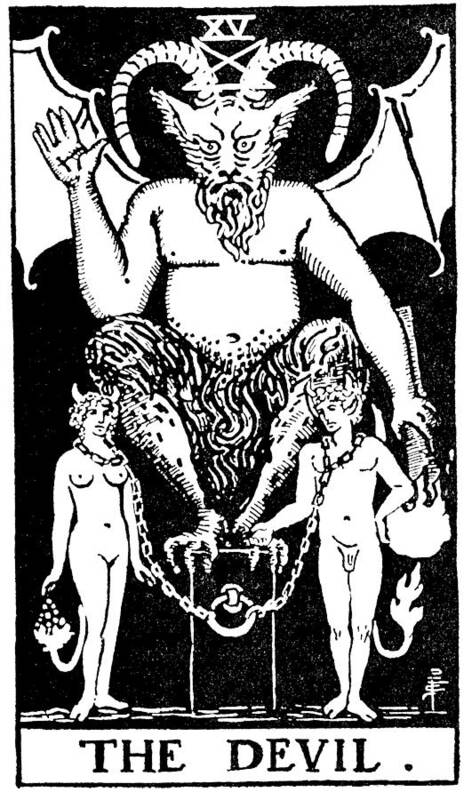
devil
Share
the devil card in tarot often carries with it a heavy shroud of negativity and fear. typically portrayed with figures chained to a monstrous figure, this card is commonly associated with bondage, temptation, and materialism. however, when explored through the lenses of queer theory and social anarchism, the devil card can be reinterpreted as a powerful symbol of resistance and liberation from oppressive structures.
for those within the queer community, the devil card can symbolize the societal chains of heteronormativity and rigid gender binaries that restrict true self-expression and identity. the card challenges individuals to recognize these chains but also to realize that the power to break free often lies within. it’s about confronting the external and internalized oppressions that bind us—be it shame, secrecy, or stigma—and recognizing the strength it takes to challenge these forces.
this card invites those grappling with their identities to reclaim power by rejecting societal norms that do not serve them. it underscores the importance of personal autonomy and the courage required to define oneself on one’s own terms. the devil, therefore, becomes not just a symbol of temptation but of the tempting possibility to redefine what freedom truly means for oneself.
the devil card also exposes the mechanisms of control and exploitation embedded within societal structures, such as capitalism and hierarchical institutions. it reflects the ways these systems hold individuals in metaphorical bondage—through economic disparities, rigid class systems, and the illusion of consumer satisfaction.
the devil encourages a collective awakening to these binding structures, advocating for a radical questioning of authority and the norms that keep oppressive systems in place. it calls for a dismantling of the societal 'devils'—the acceptance of inequality as a norm, the pursuit of material gain at the expense of human value, and the power dynamics that favor a few while subjugating many.
the imagery of the devil also invites us to confront our shadows, acknowledging the parts of ourselves that society often deems unacceptable. by embracing these aspects, individuals can achieve a more holistic self-acceptance and turn away from the shame that these shadows might traditionally provoke. this shadow work is crucial not just for personal liberation but for fostering deeper empathy and understanding within communities.
ultimately, the devil card does not have to be a source of fear but a call to action. it urges us to question the chains that bind us, whether they be personal vices, social expectations, or systemic injustices. by understanding the nature of our bindings, we gain the power to break free and pave the way for a more authentic, equitable existence.
this exploration encourages us not to fear the devil but to recognize its representation as an opportunity for profound growth and emancipation. in the tarot, as in life, understanding our constraints is the first step toward overcoming them, and the devil card, with its stark reminders, serves as a potent tool for societal and personal transformation.
for those within the queer community, the devil card can symbolize the societal chains of heteronormativity and rigid gender binaries that restrict true self-expression and identity. the card challenges individuals to recognize these chains but also to realize that the power to break free often lies within. it’s about confronting the external and internalized oppressions that bind us—be it shame, secrecy, or stigma—and recognizing the strength it takes to challenge these forces.
this card invites those grappling with their identities to reclaim power by rejecting societal norms that do not serve them. it underscores the importance of personal autonomy and the courage required to define oneself on one’s own terms. the devil, therefore, becomes not just a symbol of temptation but of the tempting possibility to redefine what freedom truly means for oneself.
the devil card also exposes the mechanisms of control and exploitation embedded within societal structures, such as capitalism and hierarchical institutions. it reflects the ways these systems hold individuals in metaphorical bondage—through economic disparities, rigid class systems, and the illusion of consumer satisfaction.
the devil encourages a collective awakening to these binding structures, advocating for a radical questioning of authority and the norms that keep oppressive systems in place. it calls for a dismantling of the societal 'devils'—the acceptance of inequality as a norm, the pursuit of material gain at the expense of human value, and the power dynamics that favor a few while subjugating many.
the imagery of the devil also invites us to confront our shadows, acknowledging the parts of ourselves that society often deems unacceptable. by embracing these aspects, individuals can achieve a more holistic self-acceptance and turn away from the shame that these shadows might traditionally provoke. this shadow work is crucial not just for personal liberation but for fostering deeper empathy and understanding within communities.
ultimately, the devil card does not have to be a source of fear but a call to action. it urges us to question the chains that bind us, whether they be personal vices, social expectations, or systemic injustices. by understanding the nature of our bindings, we gain the power to break free and pave the way for a more authentic, equitable existence.
this exploration encourages us not to fear the devil but to recognize its representation as an opportunity for profound growth and emancipation. in the tarot, as in life, understanding our constraints is the first step toward overcoming them, and the devil card, with its stark reminders, serves as a potent tool for societal and personal transformation.
